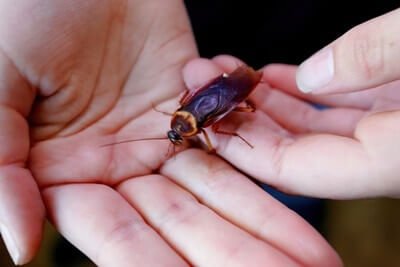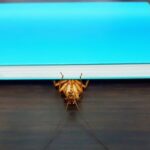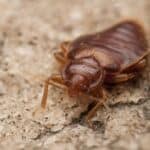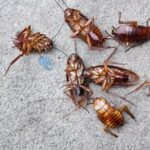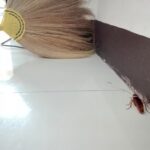When it comes to food and cockroaches, not much is off-limits, including human hair. So, after you’ve shed some hair, or perhaps even while you’re asleep, cockroaches may eat it when nothing more suitable is available for consumption.
While human hair isn’t a preferred food source, cockroaches will eat almost anything. Hair contains lipids and sebum, which can sustain cockroaches for a short while. They’re far more likely to eat shed hair rather than hair off your head under the cover of darkness as it’s less risky. Also, cockroaches don’t live in or lay their eggs in hair.
Cockroaches won’t walk through your hair while you’re awake. If you’re concerned about cockroaches eating your hair while sleeping, steps can be taken to keep them away from you.
Do Cockroaches Eat Human Hair?
Cockroaches eat almost anything. While they much prefer decaying matter, such as rotting bananas, they’ll eat hair if it’s the only food source available. Cockroaches are opportunistic feeders, motivated only by the survival of their species.
Hair roots have sebaceous glands, which secrete sebum. This is a fatty substance that’s responsible for making the hair oily and greasy. The Journal of Investigative Dermatology explains how hair contains lipids (fats) which many cockroaches are attracted to. Cockroaches prefer oily hair that’s been unwashed.
While these lipids are only a small part of hair composition, they’re sufficient to sustain cockroaches, at least until they find a superior food source. Cockroaches require starch and sugar to survive, which hair lacks, so it’s only a short-term feeding solution.
When starving, cockroaches consume each other, becoming cannibalistic and feasting on weaker cockroaches for nutrients. Therefore, smaller, younger cockroaches competing for food with larger cockroaches will consume hair and skin for survival.
Cockroaches use their strong mandibles to chew through each hair strand. Healthy hair is tough and hard to break, but cockroaches can bite through it to glean nutrients.
Do Cockroaches Like Hair?
While hair isn’t a cockroach’s favorite thing to eat, it can sustain them for a while. Cockroaches are omnivorous, so they can eat animal and plant-based matter. Depending on how hungry and desperate they are for food, hair is a reasonable option.
Cockroaches aren’t picky eaters. They’re notorious for eating anything derived from a living organism, whether dead or alive. However, before turning to hair, cockroaches will eat:
- Meat
- Decaying fruit and vegetables
- Greasy food
- Pet food, including biscuits
- Starch-based items, including soap and books
- Feces
Unfortunately, unless your home is completely empty, cockroaches will still find things to eat. Even then, according to the International Journal of Scientific Research, they can feast on certain types of paint and wallpaper paste.
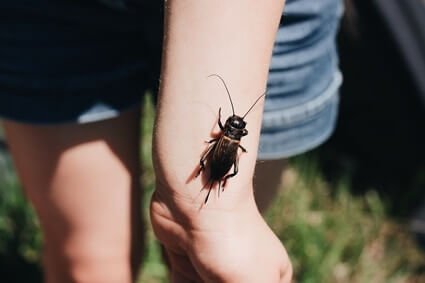
Can You Get Cockroaches in Your Hair?
American cockroaches have been known to feed on the hair, eyelashes, and eyebrows of sleeping children. While this is rare, cockroaches in infested homes that are competing for food are more likely to go to extreme measures to find sustenance.
Similarly, cockroach infestations are common in urban environments and become uncontrollable in large apartment blocks with adjoining rooms. As a result, they can get into your hair while you’re sleeping and roam from apartment to apartment in search of food.
However, if cockroaches were to eat your hair, they’d do it at night under the protection of darkness. When you wake up, you may find a hungry cockroach in your hair.
Can Cockroaches Lay Eggs in Your Hair?
Cockroaches can lay eggs in human hair, but it’s very unlikely. Most people would feel even the smallest cockroach scuttling through their hair and would remove it before it had the chance to lay its eggs.
Similarly, humans pose a huge threat to cockroaches, so they know better than to get too close. Hair isn’t the right structure for cockroaches to lay their eggs. While curly hair is slightly more preferable, hair is too smooth for the eggs to stick. Hair doesn’t have the dark, warm, and dry conditions cockroaches need for their eggs.
If you notice small, white eggs in your hair, they’re far more likely to be head lice eggs (nits). Cockroaches produce egg sacks (ootheca), which would be too noticeable.
How To Stop Cockroaches Eating Hair
If you’re concerned that cockroaches are eating your hair, you’ll want to put a stop to it. While you’ll need to eradicate the infestation, there are things you can do to keep cockroaches away from your hair in the meantime. This includes:
Wash Hair
Regular hair washing removes any oil and grease. Keeping your hair clean and oil-free deters cockroaches from eating it because there’s not enough sebum.
Wear A Hair Covering
Until you’ve got your cockroach problem under control, protect your hair while you sleep with a microfiber towel or plastic hair net.
When putting on your hair covering, ensure that it’s on tight with no visible gaps that a cockroach could crawl into. Similarly, keep all hair tucked into the covering.
Scented Oils
To keep cockroaches away from your hair, spray it with scented oil. Alternatively, spray your pillow and bedding with a fragrance that will deter cockroaches. Cockroaches hate the smell of:
- Lavender
- Lemon
- Tea tree
- Eucalyptus
- Cypress
- Peppermint
If you use one of these scents, cockroaches won’t go near your hair. However, you’ll need to reapply the spray each night to maintain the potency of the smell.
Hoover The Bed
According to the American Academy of Dermatology, it’s normal for humans to shed between 50 and 100 hairs a day. People with long or thick hair are likely to shed even more.
Humans lose hair strands each night while moving about in their sleep. As a result, it’s not uncommon to find loose hairs in the bed each morning after you’ve woken up.
These hairs may attract cockroaches when you’re not around, so hoover your bed and the area around it each morning to remove all loose strands.
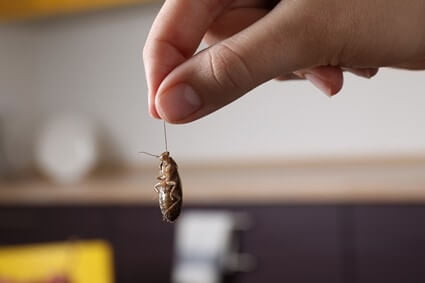
Wash Bedding
Regularly wash your bedding on a high heat. This will kill any cockroaches and destroy any eggs that may be in your bedding.
Some cockroaches sleep in mattresses with gaps or holes, giving them easy access to your hair. Cockroaches won’t survive the washing machine and dryer, so wash and change your bedding at least once a week (but preferably every other day).
Clean Plugholes
Cockroaches live in bathrooms where there’s plenty of water. They often get into homes by crawling up drains and pipes. Once in the house, that’s where they’ll hide.
Hair sheds during a wash. So, it accumulates in the plughole. The bathroom plughole is often neglected, providing cockroaches with food. You can prevent this by cleaning the plughole each time you shower. Tweezers, a plunger, or a coat hanger will do the job.
For blocked-up drains, use a white vinegar solution and bicarbonate of soda, pouring it down the drain while it fizzes. Leave for a few minutes, then rinse. The hair should dissolve, while the remnants will wash down the drain.
Do Cockroaches Cause Hair Loss?
While cockroaches aren’t directly responsible for hair loss, they harbor and spread diseases that make humans sick. One of the most common side effects is hair loss.
Dysentery is an intestinal inflammation that causes severe stomach cramps and diarrhea. Often, those with dysentery develop mucus and blood in the feces.
Humans get infected by cockroaches carrying the dysentery-causing parasite. Dysentery is a severe condition. If it’s left untreated, those affected cannot eat or drink because it’s too painful, becoming malnourished. As a result, their nutritionally poor diet leads to hair loss. Once the condition is treated, the hair will grow back again.
If cockroaches start eating your hair, you likely have a severe infestation where cockroaches are competing for food. While you can prevent cockroaches from eating your hair, this situation will only stop completely once you remove the entire infestation.
